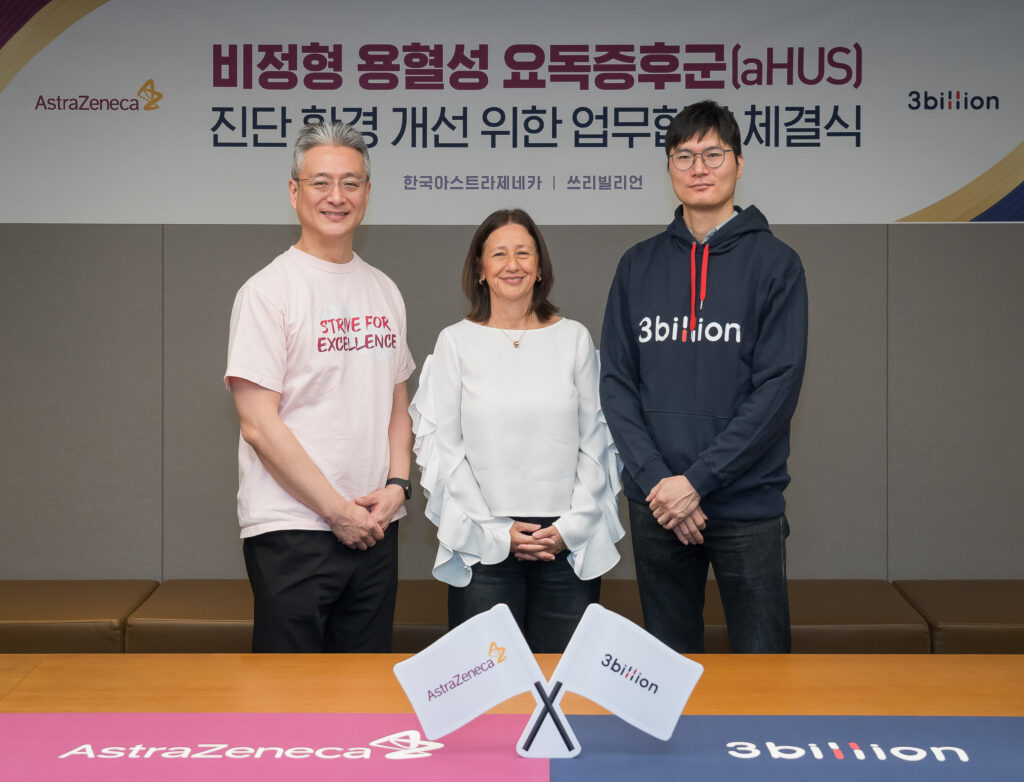3billion and AstraZeneca Korea Partner to Revolutionize aHUS Genetic Diagnosis

3billion and AstraZeneca Korea have announced a strategic partnership to expedite the genetic diagnosis of atypical hemolytic uremic syndrome (aHUS), a rare and life-threatening disease. The collaboration aims to reduce the diagnostic timeline from several weeks to just two weeks, ensuring that patients receive timely and effective treatment.
Addressing a Critical Gap in aHUS Diagnosis
Atypical hemolytic uremic syndrome (aHUS) progresses rapidly, leading to severe complications, including kidney failure and multi-organ damage. Traditional genetic testing methods require 4 to 6 weeks, making it difficult for physicians to begin treatment within the essential golden window.
Moreover, most cases are identified through differential diagnosis, a process that often delays treatment. However, research indicates that more than 60% of aHUS cases are caused by genetic abnormalities in more than ten different genes, making genetic testing the most definitive approach for diagnosis. Hence, the need for rapid diagnosis is critical.
This collaboration is centered on revolutionizing the diagnostic process for aHUS. By integrating AI-driven genetic analysis, the initiative aims to deliver diagnostic results up to three times faster than traditional methods—reducing the time from weeks to just two weeks. This breakthrough will enable timely and effective treatment for patients, significantly improving outcomes.
Accelerating Diagnosis with AI-Powered Genetic Testing
The diagnostic system under this partnership will employ Whole Genome Sequencing (WGS) and Whole Exome Sequencing (WES) to analyze up to five million genetic variants with a remarkable 99.4% accuracy. Leveraging AI, the system will be able to identify aHUS-causing mutations in under five minutes—an advancement that ensures early and precise detection.
Improving Patient Access to Life-Saving Treatment
Early and precise diagnosis will facilitate quicker access to C5 inhibitors, the primary treatment for aHUS. In South Korea, AstraZeneca Korea supplies Soliris (eculizumab) and Ultomiris (ravulizumab), both of which are covered under insurance benefits for eligible patients. This ensures that once diagnosed, patients can promptly begin lifesaving treatment without financial burden.
Leaders Committed to Advancing Rare Disease Care
Jeon Se-hwan, CEO of AstraZeneca Korea, emphasized the company’s commitment to improving the entire patient journey:
“Beyond providing effective treatment options such as Soliris and Ultomiris, we are dedicated to enhancing the overall healthcare environment for aHUS patients, including diagnosis and insurance coverage. This partnership will establish a system that shortens the diagnostic period, allowing for faster treatment and improved patient outcomes.”
Keum Chang-won, CEO of 3billion, highlighted the critical role of AI in rare disease diagnostics:
“Rapid diagnosis is the cornerstone of effective rare disease treatment. However, the challenge lies in swiftly interpreting millions of genetic variants. Without AI, this would be an insurmountable task. Our AI-driven genetic diagnostic system will enable faster, more accurate results, ensuring that more patients receive timely diagnoses and treatment.”
A Step Forward in Rare Disease Innovation
The collaboration between 3billion and AstraZeneca Korea represents a major advancement in the diagnosis and management of aHUS in South Korea. By harnessing cutting-edge genetic sequencing and AI-driven analysis, the partnership aims to redefine diagnostic standards for rare diseases, ultimately improving patient survival and quality of life.
Get exclusive rare disease updates
from 3billion.

Sree Ramya Gunukula
Marketing Leader with experience in the pharma and healthcare sectors, specializing in digital health, genetic testing, and rare disease diagnostics.





